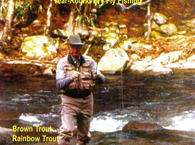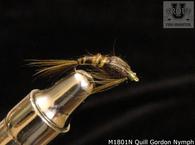Grandpa Joe was as full of tricks as a pet ‘coon.
As regular readers of this newsletter know, my paternal grandfather was in many senses a boy trapped inside an old man’s body. He only had two or three short years (six months or so each year) of formal schooling, and although literate, he barely merited the description.
Yet Grandpa Joe was as full of tricks as a pet ‘coon, so fiercely independent he would never work for another man (or listen to much advice from anyone), and an abiding source of intriguing information which an adoring grandson absorbed in sponge-like fashion.
Although I don’t know for certain, I doubt if Grandpa ever ventured as far as 200 miles from the place he was born. I do know for a fact that he figured the high country of the Smokies was about as close to an earthly heaven as anyone could imagine. On that score I happen to think he was exactly right.
Grandpa didn’t particularly care for February. He always maintained that it was the shortest month of the year because it invariably featured nasty, depressing weather. Also, it was a time of the year when Grandpa Joe was likely to be seized by what he described as “the miseries.” This was a catch-all term to describe his suffering from arthritis, general aches and pains associated with old age, and the sort of depression normally characterized as cabin fever. Mind you, Grandpa was too much of an optimist to let some pain leave him down in the dumps for long.
He was as tough as a staff shaped from seasoned hickory, and one of the finest examples of the sheer grit and determination he brought to life is associated with February. Grandpa reckoned that one answer to the frustration associated with being stuck in the house during adverse weather was the simplest thing possible—get outside. So that was what he did on a cold but clear day after two previous days of appreciable snow.
Knowing the ways of wildlife in a fashion that can only come from a lifetime of observation, Grandpa Joe figured that squirrels, after being holed up in their nests or dens for 48 hours, would be sufficiently hungry to be, as he put it, “out and about.” Accordingly, his little .22 rifle in hand, he set out to see if he couldn’t procure the makings of a supper featuring squirrels, Grandma Minnie’s cathead biscuits, gravy, and baked sweet potatoes so sweet sugar oozed through their skins.
Fatefully, a slip in the snow high up on a remote, steep ridge led to a shattered hip which would have killed most men closing in on their 80th birthday. Not Grandpa Joe. Realizing he was dependent on precisely the same resource he had been all his life—himself—Grandpa set out to save himself. That meant crawling and sliding through the snow, his badly broken hip producing intense pain with each movement, for well over a mile.
Even when he finally reached the nearest road, it was to come out on a 100-foot high bank above the roadway. He yelled and waved for awhile, but no passing vehicle heard or saw him. Realizing he had but one choice, Grandpa clenched his teeth, eased to the edge of the bank, and slid to the bottom. Once there, he flagged down the first vehicle which passed by. It happened to be a truck, and he rode to the hospital in its open bed.
After successful surgery, during the early days of recovery, the physician who had performed the operation told my father: “That’s the toughest old man I’ve ever seen. He’s got to be in tremendous pain, but he doesn’t want any pain killers. Also, other than his teeth, he’s got the body of a man 30 years younger.” The poor teeth, incidentally, were explained by Grandpa’s one vice—a great love for chewing dry twist tobacco.
Before month’s end Grandpa was back home; or, to be more precise, he was at our home. Evidently Mom and Dad figured he would require more care than Grandma Minnie could provide, and from my perspective his recuperative stay with us was a blessing. Before February was over, he was well on the way to recovery. He argued vehemently with the doctor about what he could and couldn’t do, with most of their differences revolving around whether or not he needed a crutch. He ate with the incredibly hearty appetite he always possessed, and that love of food deserves a brief foray into kitchen doings before we return to the mainstream of that particular February.
Grandpa Joe was a trencherman of the first rank, and in Grandma Minnie he married a cook worthy of his appetite. He never had a moment of indigestion and could eat most anything. He would chow down on dried hot peppers which would set your lips aflame just by contact, and ate cholesterol-laced fare such as fried streaked meat (fatback), cracklin’ cornbread, liver mush, and the like with a will. Yet he never touched a soft drink, saying that anything which would dissolve a piece of salt pork (which a carbonated beverage will) had no business in his stomach. On the other hand, he was a great one for sopping up pot likker with cornbread, thereby getting all the vitamins, and when it came to good variety in his diet Grandpa Joe was a nutritionist’s dream. He figured a meal with about eight or nine dishes—in February that might have been some type of pork (he raised his own hogs), either biscuits or cornbread, turnip greens or green beans, winter squash, turnips, creamed corn, pinto or navy beans, chow chow and pickles, and a dessert such as stack cake or fried fruit pies. Seven plus decades notwithstanding, he was a boy not only in outlook but in being possessed of a greedy gut worthy of the most active of adolescents.
But enough of his gargantuan gustatory capacity. Let’s return to the theme of his perspective on February. Within days after leaving the hospital, Grandpa and I were sitting in the living room participating in an extended session of what he called “dreamin’ and schemin’.” By that rhythmic phrase he meant looking toward the future and planning grand adventures. In the eyes of today’s sportsman, such planning might involve a trip-of-a-lifetime to Alaska or Africa, but Grandpa Joe harbored no illusions of grandeur. A spring camping trip somewhere in the Smokies, with thoughts of a pan of trout frying in the gloaming while potatoes baked in the campfire coals and a salad of ramps and branch lettuce (saxifrage) waited for the cornbread overcoats of the fish to turn a golden brown, was dream enough for him.
I’ve lived his dreams, and the forthcoming book mentioned above is in some senses the culmination of those dreams. Small wonder, when February rolls around, that my thoughts turn lovingly back to the obstinate, eccentric, opinionated, and hardy individual who was my Grandpa Joe. He epitomized what the mountain folks of his day described as “quair” (strange or different), but for me he was and remains an inspiration. When February rolls around, a fair portion of my “figurin,’” which was Grandpa’s term for contemplation, turns to him in an uplifting fashion. Read more on Jim's Newsletter.





